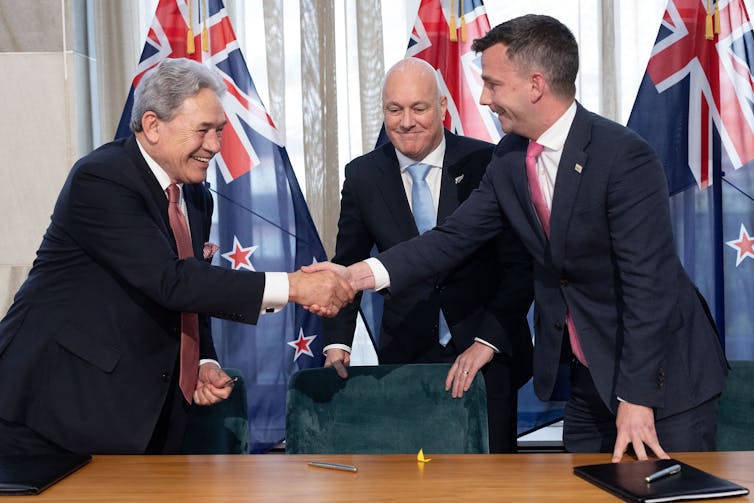the coalition needs a circuit breaker – the National Party most of all
- Written by Richard Shaw, Professor of Politics, Massey University

When finance minister Nicola Willis stands to deliver her first budget tomorrow, it will be a significant moment for her personally, but also for the coalition government, and her own National Party in particular.
The budget is the most consequential event in the annual political calendar. It expresses the fundamental democratic principle that the executive branch of government is drawn from, and accountable to, the legislature.
Constitutional probity aside, the budget also matters for purely political reasons. Willis has promised neither a spending spree nor austerity[1]. If there is a “middle course”, it will lie between the promised tax cuts and the spending cuts that pay for them.
We can expect the finance minister to paint a dramatic picture of public service back-office (and by implication previous government) profligacy. Willis will likely pitch her budget as delivering “front line” services and helping the “squeezed middle” we heard so much about during the election.
Above all, though, she must convince people the government has a plan. The wider narrative always matters. This year it matters more than usual – especially for a National Party still struggling to assert its seniority in the coalition.
Ideological tensions
The government made a great show of ticking off the 49 items in its 100-day action plan[2] – so much so, there is now a narrative vaccuum. People know what the government has done but are less sure about what it intends to do next.
Prime Minister Christopher Luxon’s taste for regularly reporting on milestones is tactical, not strategic. You can’t tell much of a story about milestones, so one of Willis’ most important jobs will be to lay out the government’s overarching vision.
It’s a tough time for overarching visions, though. The cost of living remains high and unemployment is rising[3]. Public service cuts are starting to bite[4] and – contrary to assurances[5] – are taking a toll on the delivery of front-line services[6].
National campaigned on the promise of getting New Zealand “back on track”. But in one recent poll[7], 52% said the country was on the “wrong track” (up from 41% in February). Resetting that narrative is the challenge.
Furthermore, tensions with Māori – and those non-Māori who disagree with ACT leader David Seymour’s views on Te Tiriti o Waitangi and the Waitangi Tribunal[8] – continue to simmer[9].
The government’s flagship Fast-track Approvals Bill[10] is also hitting headwinds. Federated Farmers’ concern that the bill will infringe private property rights[11] is especially telling, and has brought to the surface a tension between NZ First’s economic nationalism and ACT’s libertarian inclinations.
That is one of several questions about the coalition the budget will seek to smooth over. Others include apparent double standards[12] over charter schools (whose students will be exempt from the cellphone ban imposed on other schools), potential ministerial conflicts of interest[13], and the government’s extensive use of executive power[14].
Reasserting the National brand
It is tempting to suggest these various challenges lie behind the government’s slightly anaemic performance in recent polls[15]. But while the numbers do point to a general lack of enthusiasm for the current state of the nation, there are still two-and-a-half years to the next election – several lifetimes in politics.
Nonetheless, the government could do with a circuit breaker – ideally one that allows the National Party to start distinguishing itself from its governing partners.
Everything in a three-party coalition – from places in cabinet, space on the legislative agenda, and time in front of the media – is in short supply. So far, NZ First and ACT have consumed more of those resources than their respective electoral support arguably warrants.
ACT’s David Seymour, in particular, has been making at least as much public noise as Luxon, and has not been averse to questioning the authority[16] of the prime minister (including over ACT’s proposed Treaty principles legislation).
This is the price of National’s support at last year’s election being its lowest since 2002 (the one-off COVID election of 2020 aside). Now beholden to two minor parties exercising an outsized influence on the policy agenda, the so-called “natural party of government[17]” finds itself unnaturally compromised.
If National – and the prime minister – overindulge the more extreme ideological and policy positions of those small parties, it risks being seen as weak. Clip those parties’ wings too severely[18] and they could bring down the government.
So there is plenty riding on Nicola Willis’ big moment tomorrow. Getting the numbers right is important. Telling a compelling story is crucial.
References
- ^ neither a spending spree nor austerity (www.nzherald.co.nz)
- ^ 100-day action plan (www.beehive.govt.nz)
- ^ unemployment is rising (www.rnz.co.nz)
- ^ starting to bite (www.rnz.co.nz)
- ^ contrary to assurances (www.1news.co.nz)
- ^ front-line services (www.1news.co.nz)
- ^ one recent poll (www.thepost.co.nz)
- ^ Waitangi Tribunal (www.stuff.co.nz)
- ^ continue to simmer (www.newshub.co.nz)
- ^ Fast-track Approvals Bill (www.parliament.nz)
- ^ infringe private property rights (newsroom.co.nz)
- ^ double standards (www.stuff.co.nz)
- ^ conflicts of interest (newsroom.co.nz)
- ^ extensive use of executive power (theconversation.com)
- ^ recent polls (www.thepost.co.nz)
- ^ questioning the authority (www.rnz.co.nz)
- ^ natural party of government (teara.govt.nz)
- ^ too severely (newsroom.co.nz)

















